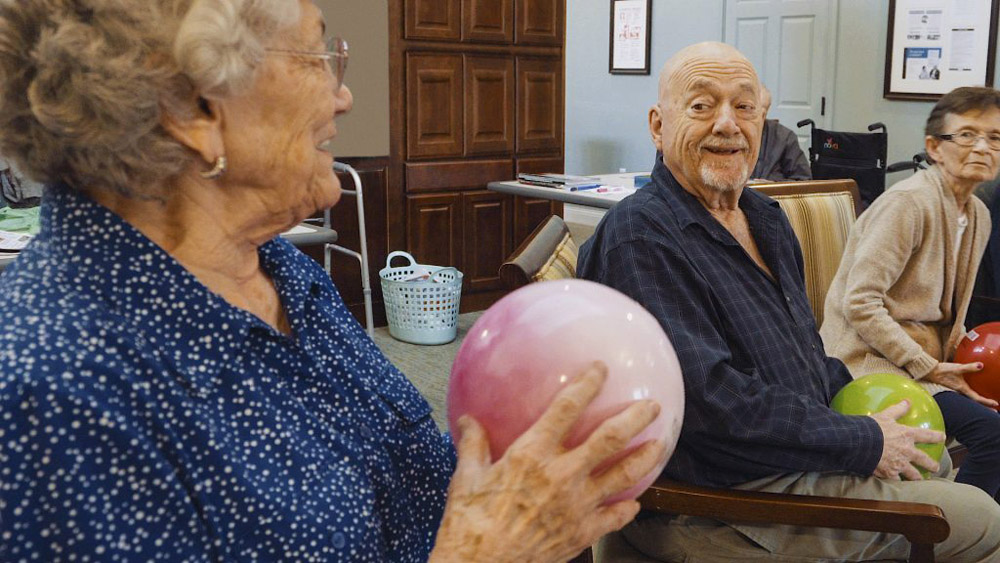Top Advantages of Memory Care: A Helpful Environment for Senior Citizens
Memory care centers offer a structured and supportive atmosphere customized specifically for elders with cognitive disabilities. These specialized settings not just improve safety and protection but also offer tailored care strategies that deal with specific needs. Engaging social tasks and experienced staff add to boosted psychological wellness and cognitive excitement, fostering a feeling of community. As family members seek confidence about their enjoyed ones' wellness, the worth of these programs becomes significantly apparent. However, understanding the complete extent of advantages calls for further expedition right into just how memory care really changes lives.
Boosted Safety and Security
Among the most significant benefits of memory care facilities is their improved security and security features, created especially to secure individuals with cognitive disabilities. These facilities prioritize the wellness of homeowners by integrating a variety of safety procedures that mitigate risks related to straying and crashes. Secure environments typically include kept track of entry and exit points, guaranteeing that locals can not leave the facilities without supervision, which substantially minimizes the risk of getting shed or experiencing unsafe situations.Additionally, memory care facilities are outfitted with emergency situation reaction systems, such as call switches and sharp systems, enabling citizens to promptly seek help when needed. Team participants are trained to recognize the one-of-a-kind challenges encountered by individuals with memory-related conditions, allowing them to respond promptly and properly to emergencies.Moreover, these facilities usually include layouts that minimize confusion, with clear signs and familiar settings that help in navigation. The presence of experienced caretakers around the clock additionally improves homeowners' safety, providing confidence to both people and their families. On the whole, the complete security and security procedures in memory care facilities develop an encouraging environment where homeowners can grow while reducing prospective threats.

Personalized Care Plans
Since each individual with memory problems has special needs and obstacles, customized care plans are a basic part of effective memory care. These customized strategies are carefully crafted by a group of health care professionals, consisting of physicians, registered nurses, and caretakers, who collaborate to analyze the certain demands of each citizen - Memory Care Charlotte. By concentrating on individual choices, clinical history, and cognitive abilities, individualized care strategies ensure that residents obtain the appropriate degree of support.An essential aspect of these strategies involves regular examinations and modifications based upon the local's transforming problem. This dynamic approach permits caregivers to modify interventions, treatments, and day-to-day routines, consequently making best use of the efficiency of care. Additionally, customized care plans enhance the top quality of life for locals by integrating their interests and promoting freedom, enabling them to take part in activities that reverberate with their individual histories.The implementation of these strategies fosters a complacency and trust fund, as homeowners and their families really feel confident that their certain demands are being addressed. Inevitably, individualized care plans not just sustain the physical wellness of people with memory disability however likewise contribute meaningfully to their emotional and psychological health, developing an alternative care setting
Engaging Social Activities
Engaging social activities play a crucial duty in boosting the general well-being of individuals with memory impairment, complementing the personalized care strategies made for their one-of-a-kind demands. These tasks cultivate links amongst citizens, providing opportunities for socialization, which is vital for emotional health and wellness and cognitive stimulation.Participating in group activities can aid lower feelings of seclusion and loneliness that several senior citizens experience. Structured experiences, such as art classes, songs therapy, or memory sessions, encourage not just interaction yet additionally the expression of creative thinking and individual identity. Such communications can considerably enhance mood and increase total life satisfaction.Moreover, involving social activities can boost cognitive function by promoting mental engagement and focus. Games, problems, and seminar test residents' reasoning skills and memory recall, aiding to maintain cognitive abilities for as long as possible.Additionally, these activities often include physical activity, which is helpful for general wellness. Mild exercises or dancing can enhance physical well-being while promoting a feeling of community amongst participants.
Specialized Memory Support
Specialized memory support is crucial for people dealing with cognitive difficulties, as it addresses their distinct requirements through customized interventions and strategies. This specific care concentrates on different kinds of memory impairment, including Alzheimer's disease and other mental deteriorations, ensuring that each resident receives the attention and services necessary for their specific condition.Key aspects of specialized memory assistance consist of personalized care plans, which are created through complete assessments of specific capacities and choices. These strategies may include cognitive treatments created to enhance memory retention, interaction, and daily living skills. Furthermore, employee in memory care facilities are educated to utilize reliable communication strategies and behavior monitoring methods that cultivate an encouraging environment. Memory Care.Furthermore, specialized memory support often includes structured routines and engaging tasks that advertise cognitive excitement and social communication. This not only boosts the lifestyle for homeowners but also assists to decrease anxiety and confusion connected with cognitive decrease. By prioritizing a caring and understanding method, specialized memory support produces an atmosphere where individuals can prosper despite their obstacles, eventually bring about boosted psychological wellness and a sense of function in their daily lives
Family Members Satisfaction
For households of people with cognitive disabilities, the assurance that comes from recognizing their loved ones are receiving specialized care can be very useful. Memory care centers provide a protected environment customized to the distinct demands of elders with Alzheimer's, dementia, and various other cognitive challenges. This customized care enables households to feel great that their loved ones remain in qualified hands, benefiting from qualified staff who recognize the intricacies of memory-related conditions.The structured regimens and engaging activities used in memory care settings not only enhance the lifestyle for citizens but likewise reduce the anxiety and worry generally experienced by family participants. Knowing that their liked ones are participated in meaningful interactions and getting personalized interest can significantly lower stress and anxiety for families.Additionally, memory care centers often provide family members with sources and support, consisting of therapy and curricula. This encourages households to better recognize their liked one's problem and navigate the obstacles connected with it. Ultimately, the combination of professional care, a caring setting, and family sustain promotes a complacency, allowing families to concentrate on valuing their time together without the worry of continuous worry.
Frequently Asked Questions
What Certifications Do Memory Care Employee Typically Have?
Memory care personnel normally have specialized certifications to successfully sustain people with cognitive impairments. Many have actually finished training in dementia care, commonly holding accreditations in gerontology or an associated field. In addition, numerous staff participants have histories in nursing, community service, or psychology, enabling them to give extensive psychological and physical support. Continual education and learning in the current care methods is likewise usual, making certain staff continue to be informed about finest methods in memory care.

Just How Do Memory Care Facilities Take Care Of Clinical Emergencies?
Memory care facilities are geared up to handle medical emergency situations via educated personnel and well-known procedures. Employee commonly get training in emergency treatment, MOUTH-TO-MOUTH RESUSCITATION, and details treatments for taking care of health dilemmas connected to cognitive disabilities. Memory Care Charlotte. Facilities frequently collaborate with local medical solutions to assure rapid feedback times - Memory Care. In addition, they keep considerable wellness documents for residents, allowing for quick identification of clinical needs and ideal interventions throughout emergencies, consequently assuring residents' health and security
Are Visitors Allowed at any moment in Memory Care?
Visitation policies in memory care facilities differ by establishment. Generally, a lot of facilities encourage friends and family to go to homeowners, promoting link and support. Details checking out hours may be carried out to ensure check these guys out the safety and security and wellness of all citizens. Facilities commonly prioritize structured communications to reduce interruptions to day-to-day routines and therapeutic tasks. It is advisable for site visitors to check with the center regarding their certain visitation guidelines and any potential constraints.
What Kinds of Therapies Are Supplied in Memory Care Areas?
Memory care neighborhoods normally supply a selection of therapeutic interventions tailored to support individuals with cognitive impairments. Usual treatments consist of cognitive excitement therapy, art and songs treatment, and reminiscence treatment, which urge involvement and emotional expression. In addition, physical treatment may be offered to boost wheelchair, while work-related treatment focuses on daily living skills. These organized activities aim to promote cognitive feature, enhance state of mind, and foster social links amongst homeowners, creating an all natural technique to care.

Just How Is Drug Monitoring Conducted in Memory Care?
Drug management in memory care neighborhoods is carried out via an organized technique to guarantee the safety and health of locals. Educated employee look after the administration of drugs, sticking to suggested does and schedules. Regular evaluations are performed to monitor efficiency and potential adverse effects. In addition, caretakers maintain clear communication with healthcare carriers and families, guaranteeing that any kind of adjustments in health condition are without delay attended to, thus optimizing the total care procedure for people with cognitive problems.